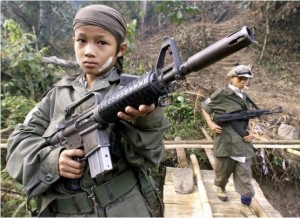U.S. Approves Military Aid for Countries with Child Soldiers
MILITARISM, 7 Oct 2013
The White House on Monday [30 Sep 2013] afternoon announced that it had issued blanket waivers to three countries, allowing them to receive military aid despite their ongoing use of child soldiers and a 2008 law to the contrary.
The Child Soldiers Prevention Act of 2008 (CPSA) is meant to bar the United States from providing military assistance to countries who have “governmental armed forces or government- supported armed groups, including paramilitaries, militias, or civil defense forces, that recruit and use child soldiers.” As per the Optional Protocol on the Convention of the Rights of the Child, “child soldiers” include children under 18 who have been forced into service, those under 15 who have volunteered to fight, and and those under 18 who have joined up with any force aside from an army. It also includes those who serve in a “support role such as a cook, porter, messenger, medic, guard, or sex slave.”
A national security interest waiver was built into the law, however, giving the President the authority to override the law should he deem it necessary to do so. That’s precisely what the Obama administration did on Monday, issuing blanket waivers to three countries known to use child soldiers: Yemen, Chad, and South Sudan. Somalia and the Democratic Republic of the Congo received partial waivers as well; this means that they’ll be granted lethal aid only in support of the peacekeeping missions currently ongoing in the country.
This year, the State Department issued a list of ten countries that had been found to be using child soldiers: Burma (Myanmar), the Central African Republic, Chad, the Democratic Republic of the Congo, Rwanda, Somalia, South Sudan, Sudan, Syria, and Yemen. Of those, seven were due to receive military aid from the United States, an action which the CPSA barred — for the most part.
The news isn’t all bad, however, as the law is actually being put into force more strictly than it was the year before. “Under today’s announcement, neither Rwanda nor the Central African Republic will receive sanctionable assistance from the US, and the DRC and Somalia received partial waivers, meaning that some assistance will be withheld,” Jo Becker, Children’s Rights Advocacy Director at Human Rights Watch, told ThinkProgress. “This is a welcome use of the US’ leverage under the Child Soldiers Prevention Act. In previous years, we have seen waivers for most countries, and last year, a partial waiver for only one country — the DRC.”
“We’ve seen that the Child Soldiers Prevention Act can work,” she continued. “Last year, just days after the US withheld assistance from the Democratic Republic of Congo, the Congolese government signed an agreement with the UN to end their use of child soldiers.” Somalia and the DR Congo were both removed from the United Nations’ List of Shame this year, after pledging to take steps to end the use of child soldiers.
Scott Edwards of Amnesty International agreed that there can be some usefulness in the waivers. “As far as Amnesty, we generally oppose just as a matter of principle blanket waivers,” he told ThinkProgress. But partial waivers, he continued, allow the president the ability to use aid as leverage to compel governments to take certain steps to combat use of child soldiers. “If you look at some of waivers that have been granted, some countries have taken steps over the last year,” he said, also pointing to the DR Congo “Even though they still appear on list, they have taken steps towards transparency, towards the vetting of ranks, towards justice and accountability mechanisms.” Both Edwards and Becker stressed to ThinkProgress, though, that there’s more that the United States can do to press its allies to end the use of child soldiers.
Go to Original – thinkprogress.org
DISCLAIMER: The statements, views and opinions expressed in pieces republished here are solely those of the authors and do not necessarily represent those of TMS. In accordance with title 17 U.S.C. section 107, this material is distributed without profit to those who have expressed a prior interest in receiving the included information for research and educational purposes. TMS has no affiliation whatsoever with the originator of this article nor is TMS endorsed or sponsored by the originator. “GO TO ORIGINAL” links are provided as a convenience to our readers and allow for verification of authenticity. However, as originating pages are often updated by their originating host sites, the versions posted may not match the versions our readers view when clicking the “GO TO ORIGINAL” links. This site contains copyrighted material the use of which has not always been specifically authorized by the copyright owner. We are making such material available in our efforts to advance understanding of environmental, political, human rights, economic, democracy, scientific, and social justice issues, etc. We believe this constitutes a ‘fair use’ of any such copyrighted material as provided for in section 107 of the US Copyright Law. In accordance with Title 17 U.S.C. Section 107, the material on this site is distributed without profit to those who have expressed a prior interest in receiving the included information for research and educational purposes. For more information go to: http://www.law.cornell.edu/uscode/17/107.shtml. If you wish to use copyrighted material from this site for purposes of your own that go beyond ‘fair use’, you must obtain permission from the copyright owner.
